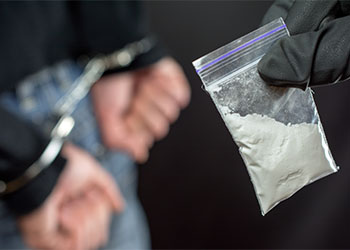Understanding Drug Crime Charges
Nov. 22, 2022
 Anytime you’re faced with a criminal charge, it’s imperative that you educate yourself about the law, the legal process, and what possible consequences you may face from a conviction or even an accusation. This is no doubt a stressful and overwhelming time, but taking your charges seriously, especially drug charges, will help you navigate the complex issues and mitigating factors. A strong legal defense team can help you through this difficult time and fight for you.
Anytime you’re faced with a criminal charge, it’s imperative that you educate yourself about the law, the legal process, and what possible consequences you may face from a conviction or even an accusation. This is no doubt a stressful and overwhelming time, but taking your charges seriously, especially drug charges, will help you navigate the complex issues and mitigating factors. A strong legal defense team can help you through this difficult time and fight for you.
If you’ve recently been charged with manufacturing drugs, delivering drugs, or drug possession, reach out to criminal defense attorneys who can help. The lawyers at McBride Law are located in Quincy, Massachusetts, but they can represent clients throughout the state including Norwell, Hingham, Weymouth, and Boston.
Controlled Substances
A controlled substance is a broad term that encompasses any drug or chemical that’s federally regulated or regulated at the state level. Importantly, a drug doesn’t have to be illegal to be considered a controlled substance, and you can still receive charges for an otherwise legal substance. This is because part of how your crime is evaluated is by how the drug is being used, not what the drug is.
All controlled substances are classified in different “schedules” from I to V based on their level of danger, with Schedule I being the most serious.
Schedule I drugs have no known medical usage and have a high propensity for addiction and abuse. Examples of Schedule I drugs are heroin, lysergic acid diethylamide (LSD), and marijuana (cannabis).
Schedule II drugs also have a high degree of abuse and addiction, though they have medical usage. They include amphetamine and methamphetamine.
Schedule III drugs have lower incidences of abuse, but they can still lead to moderate or mild physical and psychological dependence. Codeine, buprenorphine, and ketamine are all examples of Schedule III drugs.
Schedule IV drugs have a relatively low potential for abuse and include many common prescription drugs like diazepam, alprazolam, and clonazepam.
Schedule V drugs have the lowest potential for abuse and include over-the-counter drugs like cough syrup.
State vs. Federal Drug Charges
One important thing to understand about being arrested for a drug-related crime is that you could be facing both state and federal charges. Your defenses against drug charges will vary depending on the crime. This is why you need a skilled attorney working on your side to navigate this complex set of laws.
It’s also true that just because something is illegal at the federal level, it doesn’t necessarily mean that the state will press charges in accordance with those laws. This is most commonly seen with marijuana-related crimes since this drug is still considered a Schedule I drug federally even though recreational marijuana is legal at the state level. In general, you’ll be looking at federal charges if you’re arrested for trafficking across state lines, but if your crime occurred solely within Massachusetts, you’ll be charged at the state level.
Common Drug Charges
You may be looking at more than one charge after your arrest, and this can include crimes of possession, manufacturing, or trafficking.
Of these, possession is the most common and often the least severe. However, you should still fight against this charge because many possession charges are coupled with other, more serious charges. You may also be able to fight off a simple possession charge if law enforcement used an illegal search and seizure method to arrest you.
A charge of manufacturing drugs will often be a federal crime and can also include cultivation charges for cannabis seeds or marijuana.
Lastly, a distribution of trafficking crime will also likely be charged at the federal level. These charges can become more severe depending on a few key factors: the amount of drugs that are being trafficked, the type of drugs, and who and where they were being distributed to.
Possible Penalties
The possible penalties for drug charges can vary widely depending on what specific crime you’ve been convicted of, what prior offenses you’ve been convicted of, and whether there were any aggravating factors to your charge. For example, if you were caught distributing drugs around minors at a school, your penalties will be much higher. Or, if you were caught trafficking large amounts of drugs across state lines, your penalties will be more severe. Common consequences include fines, jail or prison time, or probation. In some cases, you may be eligible for a diversion program, but this is an option generally reserved for younger offenders and those who have no prior criminal convictions.
Strong & Compassionate Legal Advocacy
Coming face to face with drug charges isn’t easy. Don’t face them alone. Call Attorneys McBride and Foti to schedule a consultation from the McBride Law office in Quincy, Massachusetts. They serve anyone throughout the state, and with their experience and personalized attention, they are ready to help you fight your drug charges. Take those first steps now, and call today to get started.
